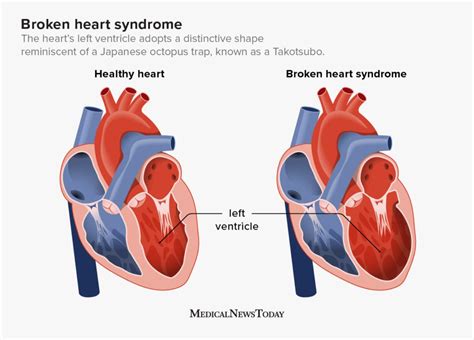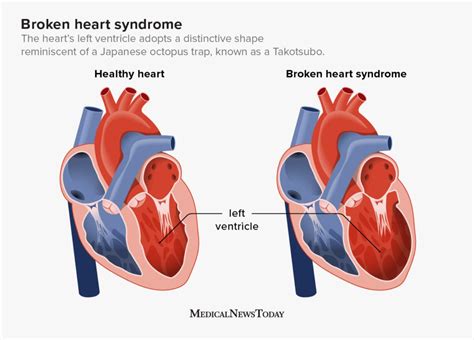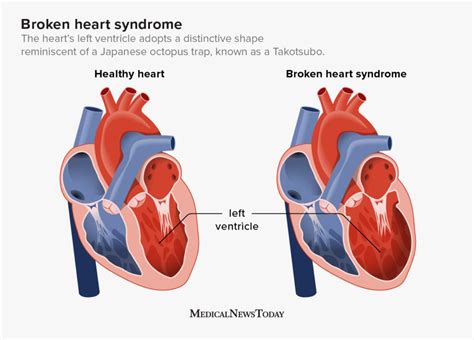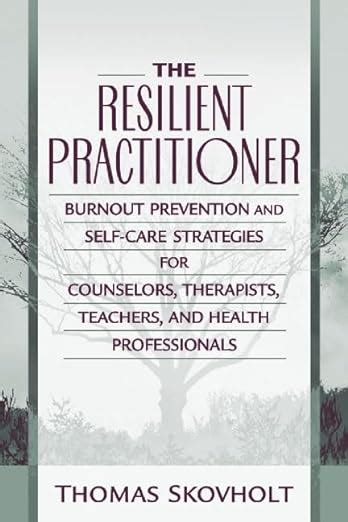Intro
Discover the 5 shocking ways Broken Heart Syndrome hurts, causing cardiac issues, emotional distress, and mental health problems, including stress, anxiety, and depression, affecting overall well-being.
The emotional pain of a broken heart is a universal human experience that can affect anyone, regardless of their background or circumstances. While it's often viewed as a metaphorical condition, broken heart syndrome, also known as takotsubo cardiomyopathy, is a real medical condition that can have serious physical consequences. The condition is characterized by a sudden weakening of the heart muscle, often triggered by intense emotional stress, such as the loss of a loved one, a breakup, or a traumatic event. In this article, we will explore the ways in which broken heart syndrome can hurt, both emotionally and physically, and what you can do to protect yourself.
The emotional pain of a broken heart can be overwhelming, making it difficult to perform daily tasks, maintain relationships, or even get out of bed. The feeling of sadness, grief, and loss can be intense, and it's common for people to experience anxiety, depression, and post-traumatic stress disorder (PTSD) after a traumatic event. The emotional toll of broken heart syndrome can also affect a person's self-esteem, confidence, and overall well-being, making it challenging to recover and move forward.
Broken heart syndrome can also have serious physical consequences, including chest pain, shortness of breath, and even heart failure. The condition can be triggered by a surge of stress hormones, such as adrenaline and cortisol, which can cause the heart to become "stunned" and unable to function properly. This can lead to a range of symptoms, including palpitations, dizziness, and fainting, which can be frightening and debilitating. In severe cases, broken heart syndrome can even lead to cardiac arrest, which can be life-threatening if not treated promptly.
Understanding Broken Heart Syndrome

Causes and Risk Factors
The causes and risk factors for broken heart syndrome are complex and multifaceted. Some of the most common triggers include: * Intense emotional stress, such as the loss of a loved one or a traumatic event * Physical stress, such as a car accident or a serious illness * Hormonal changes, such as those experienced during menopause or pregnancy * Certain medical conditions, such as high blood pressure, diabetes, or heart disease * Medications, such as those used to treat depression, anxiety, or high blood pressurePhysical Consequences of Broken Heart Syndrome

Treatment and Management
Treatment for broken heart syndrome typically involves a combination of medications, lifestyle changes, and emotional support. Some of the most common treatments include: * Medications to manage symptoms, such as beta blockers, ACE inhibitors, or diuretics * Lifestyle changes, such as stress reduction, exercise, and a healthy diet * Emotional support, such as counseling, therapy, or support groups * Hospitalization, in severe cases, to monitor and manage symptomsEmotional Consequences of Broken Heart Syndrome

Coping Mechanisms and Support
Coping with the emotional consequences of broken heart syndrome requires a range of strategies, including: * Emotional support, such as counseling, therapy, or support groups * Lifestyle changes, such as exercise, meditation, or yoga * Social support, such as friends, family, or online communities * Self-care, such as getting enough sleep, eating a healthy diet, and engaging in activities you enjoyPrevention and Self-Care

Conclusion and Next Steps
Broken heart syndrome is a complex and potentially life-threatening medical condition that requires prompt treatment and support. By understanding the causes, symptoms, and consequences of the condition, you can take steps to protect yourself and seek help if you're experiencing intense emotional stress or trauma. Remember, you're not alone, and there are many resources available to support you, from counseling and therapy to online communities and support groups.What are the symptoms of broken heart syndrome?
+The symptoms of broken heart syndrome include chest pain, shortness of breath, palpitations, dizziness, and fatigue. In severe cases, the condition can lead to cardiac arrest, which can be life-threatening if not treated promptly.
How is broken heart syndrome treated?
+Treatment for broken heart syndrome typically involves a combination of medications, lifestyle changes, and emotional support. Medications may include beta blockers, ACE inhibitors, or diuretics, while lifestyle changes may include stress reduction, exercise, and a healthy diet.
Can broken heart syndrome be prevented?
+While broken heart syndrome cannot be completely prevented, there are steps you can take to reduce your risk. These include managing stress, maintaining a healthy lifestyle, building strong relationships, and seeking emotional support if you're experiencing intense emotional stress or trauma.
What are the emotional consequences of broken heart syndrome?
+The emotional consequences of broken heart syndrome can be severe and include anxiety, depression, post-traumatic stress disorder (PTSD), grief, and loss of self-esteem or confidence.
How can I cope with the emotional consequences of broken heart syndrome?
+Coping with the emotional consequences of broken heart syndrome requires a range of strategies, including emotional support, lifestyle changes, social support, and self-care. This may include counseling, therapy, or support groups, as well as activities such as exercise, meditation, or yoga.
We hope this article has provided you with a comprehensive understanding of broken heart syndrome and its consequences. If you're experiencing intense emotional stress or trauma, don't hesitate to reach out for support. Share this article with someone you know who may be struggling with broken heart syndrome, and let's work together to raise awareness and promote healing. What are your thoughts on broken heart syndrome? Have you or someone you know experienced the condition? Share your story in the comments below, and let's start a conversation about this important topic.
